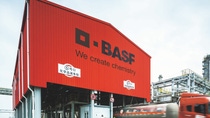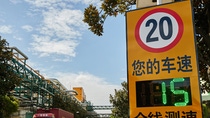Safety always

Logistics is an important part of chemical transactions as customers want products they have ordered to be delivered punctually and of the correct amount and quality.
However, transportation safety is a huge challenge in the field of chemical safety. In recent years, various chemical transportation accidents have occurred; some accidents have caused serious casualties, economic loss and impacted society and the environment.
So how we ensure safe transportation of chemicals? It is inseparable from the joint efforts of chemical enterprises, logistics service providers, industry associations and government departments.
"BASF never compromises on safety. With a wealth of industry knowledge and experience we are committed to promoting the sustainable development of chemical logistics and the entire chemical industry."
Xiao Li, Director, EHS Services, BASF Greater China
BASF ensures transportation and distribution safety through strict regulations. Measures are taken at all stages, from the delivery of raw materials, storage and distribution of chemical products to customers, to the transport of waste from sites to disposal facilities. Based on the European Chemical Industry Council standards, the company uses its global guidelines that include the establishment of a stringent review system for internal storage and transportation safety management, the integration of chemical product data and regulatory requirements through the SAP management system, and the implementation of a global unified evaluation and management system for logistics service suppliers. If an incident occurs, despite all of the preventive measures, BASF provides swift and coordinated assistance across the globe through an external network of transportation and distribution safety (TDS) advisors.
While regulating its operations with rigorous standards and norms, how to identify, manage and train logistics providers is also an important responsibility of BASF. To ensure transport and distribution safety at all stages, The safety performance of logistics service providers is as important as the commercial bidding. BASF sets strict environmental, health and safety (EHS) review standards and key assessment indicators. In terms of management, BASF also has high requirements for the configuration of transportation vehicles and the protective equipment for transportation personnel. For example, in case of chemical leakage drivers must wear protective clothing before taking action. There are detailed rules for the configuration of medical boxes on the vehicles. In terms of training, BASF regularly shares its advanced experience with logistics providers through seminars and workshops.
In addition to strengthening the evaluation and management of logistics providers, safety is inseparable from the efforts of the service providers themselves.
Shanghai Xiaorong Logistics Co., Ltd. is a subsidiary of CJ Rokin Logistics Group specializing in the transport of chemicals. Because of its excellent comprehensive performance in safety and quality management, it was named an "AAA level enterprise" in the safety and integrity assessment of road dangerous goods transportation industry of Shanghai by the Shanghai Municipal Transportation Committee from 2012 to 2017.

Speaking of the company’s drivers, general manager Li Shumin was fully confident in their performance on the road. Regarding the safety of chemical logistics, he said the most important factor was people. He noted that the causes of transport accidents included the unsafe behavior of people and unsafe state of goods, the former accounting for 90 per cent of incidents. Therefore, Xiaorong has taken comprehensive management measures against the unsafe behavior of people. A complete set of certificates, including driving license and qualification certificate, are a prerequisite for becoming a Xiaorong driver. Secondly, weekly safety meetings and regular training are carried out to help drivers develop defensive driving habits and abandon bad behavior such as changing lanes, overtaking, speeding and fatigue driving. Thirdly, in the course of driving, Xiaorong monitors a driver's track and speed in real time through the Beidou satellite navigation system or the Global Hawk system and issues timely alarms to prevent accidents. Lastly, if a violation occurs, the company will investigate accountability and carry out rectification.
As Xiaorong mainly serves multinational chemical companies with high safety compliance requirements, such as BASF, its annual investment in safety is much higher than the industry standard. In Li's view, BASF, over the past 10 years, has continuously refined its transport management and distribution safety, which is challenging for logistics service providers but also helped them to improve themselves. For example, multiple nationwide safety management actions on the road transportation of dangerous goods conducted in recent years has never had any impact on its business.
The company has been honored with the BASF "Best Logistics Service Provider" award three times for excellent comprehensive performance in logistics safety and other logistics indicators. Through holistic assessment of the service capacity of suppliers, the award encourages excellent logistics service providers of BASF to raise their service standards towards environmental protection, health and safety, and promotes the logistics concept of sustainable development.

Safety can never be guaranteed by a single enterprise alone. Through the years, BASF has been taking an active part in chemical industry activities in Europe and the United States to promote the sector’s safe and sustainable development with its counterparts. These practical experiences have also been brought to China to facilitate the transformation of the country’s chemical industry.
According to Xiao Li, BASF has been working with the Ministry of Transportation, the China Petroleum and Chemical Industry Federation and other government departments and industry associations to share its experience in storage and transportation safety management, endeavoring to contribute to the improvement of industry safety standards.
The safety quality assessment system (SQAS) is a tool initiated by the European Chemical Industry Association to assess chemical logistics service providers. In 2006, BASF introduced the system to China and established a road safety quality assessment system (RSQAS) for chemical transport. BASF has been promoting the development of RSQAS in China with other international chemical manufacturers. This tool enables multiple chemical companies to jointly review the practices of logistics service providers making standards more uniform and transparent. Respective LSP audits conducted for each chemical company can be reviewed through one system. Both sides, therefore, can save resources and concentrate more on their main production and transportation business. To date, more than 500 road reviews have been completed under this system.
To make the evaluation system more suitable for China's national conditions, regulations and standards, since 2017 BASF has been working with the Dangerous Goods Transportation Service Alliance under the Ministry of Transportation and other chemical manufacturers. This has been undertaken to explore and establish China's Chemical Road Safety Assessment System (CRSAS). This system is expected to cover more local enterprises and logistics providers and also be more operational.
As a leading enterprise in the chemical industry, BASF is working with government departments to contribute to the improvement of industry safety standards, including helping to translate, introduce and absorb some advanced management systems of the European Agreement concerning the International Carriage of Dangerous Goods by Road (ADR). In the past two years, BASF has also participated in the revision of a number of regulations and standards including the Rules for Road Transportation of Dangerous Goods (JT/T617) and the General Rules for Storage of Common Chemicals (GB15603).
Every year, BASF sites carry out more than 200,000 gate inspections. These cover drivers' information, vehicle conditions, the state of goods among others, which brings challenges to the supervision of storage and transport safety. In 2016, the transportation and distribution safety team of BASF Greater China joined with the supply chain and information services, procurement and factory EHS to develop an electronic gate inspection system.
By connecting the tablet computers in the hands of gate inspectors in a factory with the computers in the office, the system helps the TDS team register vehicle information, monitor trucks in real time and quickly generate electronic reports with photos. This is so that the company can maintain and analyze the information of service providers and share it with them in a timely fashion to remove any potential risks.

The system greatly improves the efficiency of gate inspections and enhances the inspection effect. For example, before the use of the system the handwritten records of fire extinguisher problems were more general and mainly relied on the subjective judgment of the recorder. The system now specifically describes all problems and the recorder only needs to click on the relevant options. All truck data is kept in the system and overloading can be found quickly before a truck leaves the site. The system also helps to effectively implement a blacklist and timely intercept a truck on the list. In case of accidents, these records can be used to assist an investigation.
At present, the system has been implemented in more than 80 per cent of BASF’s China production sites and has been widely supported. Other sites will complete the digitalization of their gate inspection by this year. The system will also be promoted among other Asian production sites in future.
BASF has shared the system with logistics providers so that they can conduct pre-inspections through the system. The company expects that its system can be connected with suppliers' systems to form a more transparent, more responsive system that will reduce potential safety hazards.